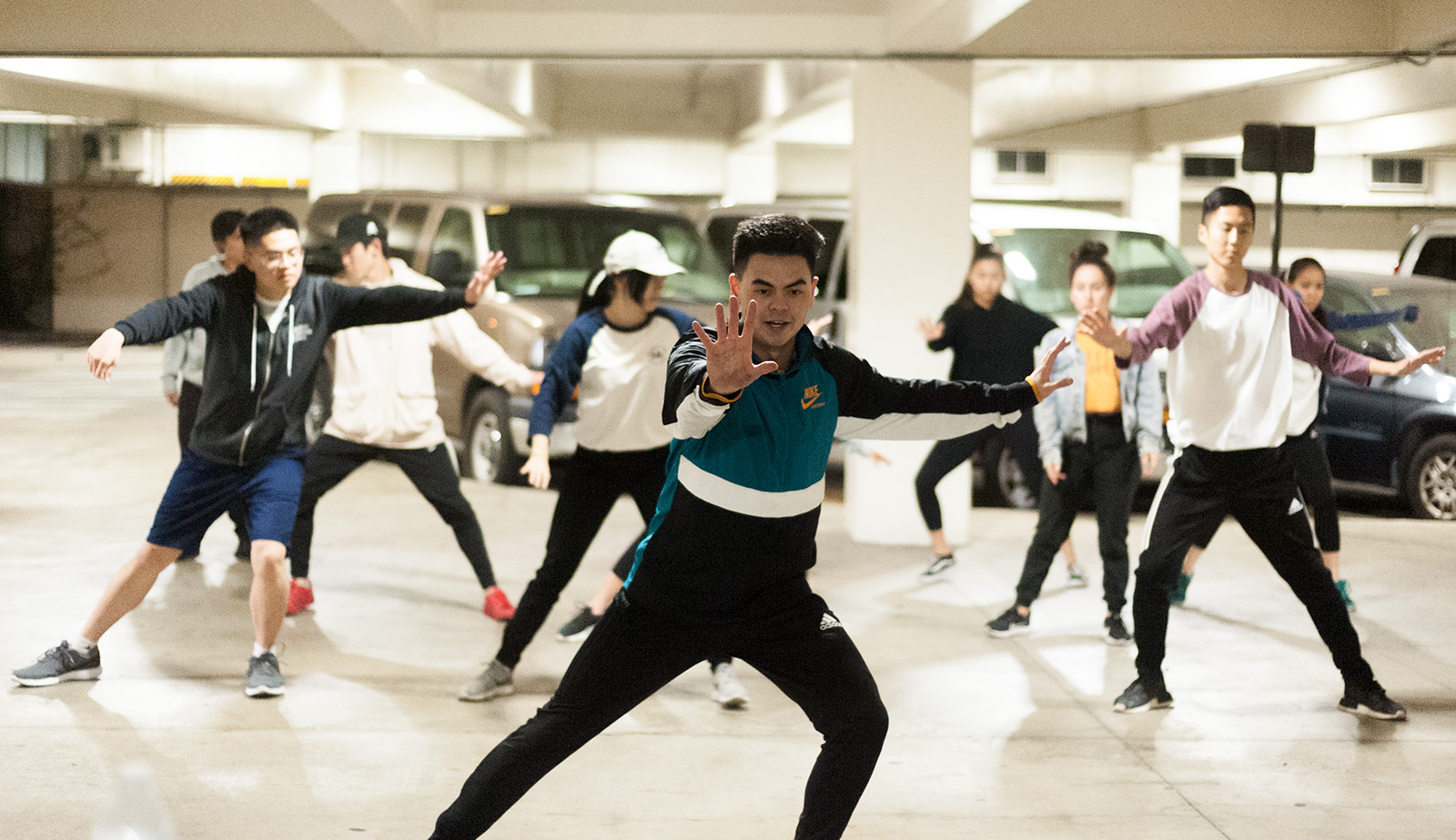Discussion on mental health issues takes on new form in dance club Psypher

Psypher, a dance club at UCLA, aims to explore mental and physical well-being through the art of dance. The club members will engage in group discussions and dances to express opinions on and learn about certain aspects of mental health. This quarter’s theme is the impact of personal relationships on mental health. (Grace Yu/Daily Bruin)
By Nina Young
April 23, 2018 1:09 a.m.
Members of the club Psypher embodied the complexities of modern dating by dancing to Sabrina Claudio’s R&B song, “Belong to You,” in a parking lot Friday night.
At its first meeting of the quarter, Psypher began exploring its spring theme: the impact of personal relationships on mental health. The club, which was founded in fall of 2017, uses dance to educate members about mental health issues. In biweekly workshops, the club will encourage members to share their opinions about both romantic and platonic relationships in group discussions and dances, said Matthew Diep, founder of Psypher.
“Dating is a huge part of our mental health,” said the fourth-year psychology student. “Especially at this point in time, I feel like it consumes a lot of us, and it is worth talking about how different it is.”
Before they begin dancing, club members discuss solutions to stigmatized issues – previous workshops touched on topics such as depression, domestic abuse and addiction. They also share their own handouts that contain research and statistics on mental health issues before they start dancing, Diep said.
Psypher uses choreography from many different dance styles, such as jazz or hip-hop, to investigate mental health issues. Diep acted as the guest choreographer Friday night, and taught a dance that included hip-hop steps like the pony, which involves the body shifting down as the legs move up, and slow, full gestures such as the body roll. The controlled motions and sensual song expressed intimacy and welcomed participants to the idea of talking about relationships, Diep said.
“Mental health (issues) are … diverse. … It’s not like we’re always sad or we’re always angry or happy,” Diep said. “I feel like all these different genres can help us capture all these different emotions.”
While Diep led the dance portion of Friday’s workshop, third-year communication student JK Suh guided the dialogue about today’s dating landscapes, discussing the impact of dating apps and changing attitudes toward sex. Suh said he encouraged participants to take a new view on a familiar topic by focusing on the positives of modern dating rather than the negatives, such as how technology makes it easier to communicate with a significant other.
Following an open discussion, guest choreographers explain how their pieces connect to that quarter’s mental health topic and then teach the dance to participants. Diep said the workshop’s dancing component is a way for the dancers to take a break from their daily lives and physically experience their feelings.
“If it’s a hardcore, intense piece, you have to embody that character,” Diep said. “It’s a whole way to slow down and connect to your body, connect to your emotions and express those things.”
Suh said one of the group’s past workshops showed how the hip-hop dance called popping, which involves a fast motion of muscles contracting and relaxing, could release tension for people who have experienced trauma. Another workshop explored mental health experiences in the LGBTQ community, and Psypher dancers attempted empowering movements that originate from the community, such as “waacking” and “voguing.”
Alexia Diaz, a first-year biology student, said she feels that Psypher is a safe space to discuss stigmatized topics and voice personal opinions. Her interest in neuroscience and psychology, as well as her dance experience, drew her to the group. She said a workshop focusing on dance therapy showed her that movement can help people explore mental health issues if they are not comfortable speaking about them.
“Sometimes there is stuff that you feel is burdening you, and it’s hard to put it into words. Sometimes releasing it through a physical medium, through your body, lets you release that without having to say anything,” Diaz said. “That’s a cathartic experience.”
At Friday’s workshop, Diaz said she appreciated the freedom she felt through Diep’s choreography. Movements like the body roll allowed her to take on the essence of a character undergoing an intimate experience. Diaz said embodying a character through dance is a fun way to understand another person’s perspective.
“On the one hand, you’re creating this character, so it is like a persona, but on the other hand, it is like exploring and thinking outside of yourself,” Diaz said.
Psypher helps participants understand they do not have to deal with mental health on their own, but can instead explore and destigmatize the topic communally, Diep said.
“(Talking about) mental health is just really unapproachable and sometimes boring for people, and having this cool, fun aspect to it can keep you engaged,” Diep said. “It … makes these learning experiences more impactful.”


